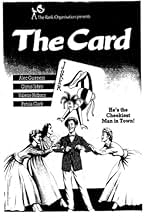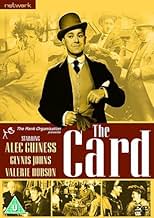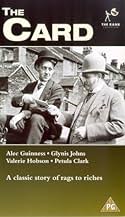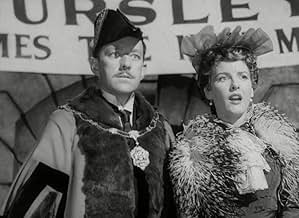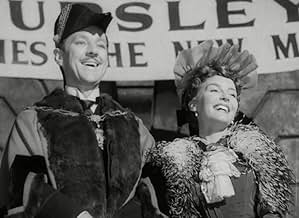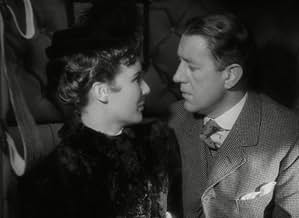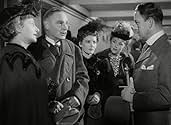IMDb-BEWERTUNG
7,0/10
2045
IHRE BEWERTUNG
Füge eine Handlung in deiner Sprache hinzuEdward Machin, an Edwardian-era young rogue of lowly origin, decides he must do what he can to raise his living standards in order to see the world and shape his own destiny.Edward Machin, an Edwardian-era young rogue of lowly origin, decides he must do what he can to raise his living standards in order to see the world and shape his own destiny.Edward Machin, an Edwardian-era young rogue of lowly origin, decides he must do what he can to raise his living standards in order to see the world and shape his own destiny.
- Regie
- Drehbuch
- Hauptbesetzung
- Für 1 Oscar nominiert
- 1 Nominierung insgesamt
John Adams
- Customs Official
- (Nicht genannt)
Peter Copley
- P. Shillitoe
- (Nicht genannt)
Mark Daly
- Lord Mayor
- (Nicht genannt)
Arthur Dibbs
- Doorman
- (Nicht genannt)
Deidre Doyle
- Widow Hullins
- (Nicht genannt)
Henry Edwards
- Mr. Cotterill
- (Nicht genannt)
Empfohlene Bewertungen
This terrific 1952 British black and white movie directed by Ronald Neame (with an inspired casting of a young Alec Guinness as Arnold Bennett's wonderful character, the upwardly-mobile Denry Machin), loses none of the story's magic and captures the flavour of the period (from about 1888 and onwards) and the Potteries (North Staffordshire, England) absolutely perfectly. The ballroom scene (among many others) is an utter delight.
The beautiful Valerie Hobson as the "Countess of Chell" is enchanting. Glynis Johns as the frivolous and extravagant social-climbing dance instructress is equally lovely. Edward Chapman as Mr Duncalf is at his usual pompous best. A marvellous supporting cast puts in a stalwart performance and are all on top form, and the acting by all involved is superb (although Petula Clark is a little too reserved and somewhat bland), but after all that, the star of the show surely has to be Joey the Mule.
I don't intend to give you the storyline as enough reviewers have done that already. Suffice it to say that of all the transferences of classic stories to the screen, this must be one of the best, and I defy anyone (young or old) who may watch it, not to enjoy it (even though it is in black and white), and unfortunately, even with colour and much improved modern techniques, marvellous movies like this just aren't made anymore.
The beautiful Valerie Hobson as the "Countess of Chell" is enchanting. Glynis Johns as the frivolous and extravagant social-climbing dance instructress is equally lovely. Edward Chapman as Mr Duncalf is at his usual pompous best. A marvellous supporting cast puts in a stalwart performance and are all on top form, and the acting by all involved is superb (although Petula Clark is a little too reserved and somewhat bland), but after all that, the star of the show surely has to be Joey the Mule.
I don't intend to give you the storyline as enough reviewers have done that already. Suffice it to say that of all the transferences of classic stories to the screen, this must be one of the best, and I defy anyone (young or old) who may watch it, not to enjoy it (even though it is in black and white), and unfortunately, even with colour and much improved modern techniques, marvellous movies like this just aren't made anymore.
This is another superb British comedy of the early '50s. The story (based quite closely upon the Arnold Bennett novel) is fun, the script by Eric Ambler spot on, and the production well done. The black and white photography is truly beautiful, and captures the sense of time, place and atmosphere better than any amount of glossy colour could have. I gather that some of the exteriors were shot in Burslem ("Bursley" in the film) and Llandudno, but even if they were not, they feel as though they could have been. The only time the illusion of reality was lost was during some clunky back-projection when Denry was driving his new car.
The performances were superb, as one expects of a British film of the period, from the principals, especially Alec Guinness and Glynis Johns -how beautiful she was, how grating her voice, and what a character she created - to extras with a few lines, e.g., Michael Hordern as a sympathetic bank manager.
In all, this film is a total delight.
The performances were superb, as one expects of a British film of the period, from the principals, especially Alec Guinness and Glynis Johns -how beautiful she was, how grating her voice, and what a character she created - to extras with a few lines, e.g., Michael Hordern as a sympathetic bank manager.
In all, this film is a total delight.
It's easy to like this charming, unpretentious film in which Alec Guinness's restrained performance hits all the right notes. His fine work during the early 50's is unfortunately overshadowed by the public's identification with him in such big budget productions as The Bridge Over the River Kwai and Lawrence of Arabia. It's the "small movies" like this one (The Lady Killers, The Last Holiday, The Captain's Paradise and Man in the White Suit also come to mind) where we see his real skill and genius. The Card is enhanced by the appealing characters played by Glynis Johns and Valerie Hobson. Fans will also recall Hobson in another Guinness film, Kind Hearts and Coronets. One bit of puzzling trivia: How did Eric Ambler, known mostly for his espionage novels and, later, for Topkapi, come to write the screenplay for this gentle comedy?....
Alec Guinness' reputation as a serious actor tends to overshadow the subtle but deftly comic early work he was involved in, even when the films themselves (especially his handful of Ealing classics) are highly-regarded. This was another fine (and reasonably popular) vehicle for him in which he plays a go-getter(!) who uses his wits – and the helping hand lent him by Fate – to rise the ranks in British society from a washer-woman's son to, ultimately, Mayor of his town. In this respect, the film reminded me of two similar efforts i.e. NOTHING BUT THE BEST (1964) and THE RISE AND RISE OF MICHAEL RIMMER (1970) – which I owned but had not yet checked out (and which I then promptly opted to include in my ongoing Christmas schedule); of course, thematically, it is not unlike Ealing's own KIND HEARTS AND CORONETS (1949; in which Guinness had memorably played eight murder victims)...but the approach here is altogether more genteel and nostalgic (even if there are a few undeniable belly-laughs along the way), thus lacking the pointed satirical barbs which distinguished the earlier (and later) films. Anyway, the star delivers an entirely disarming performance and the film – augmented by its charming period setting – proves a most delightful concoction. He is abetted besides by three splendid leading ladies in Glynis Johns (surprisingly playing haughty), Valerie Hobson (obviously aristocratic, her feathers apparently not even unruffled by a pratfall!) and Petula Clark (not yet the chart-topping singer and, tackling the role of a commoner, is naturally Guinness' eventual choice of partner). Foremost among the supporting cast, then, is Edward Chapman – later a stooge in many a Norman Wisdom comedy – as Guinness' disgruntled former employer, but several other familiar faces crop up throughout (Peter Copley, Michael Hordern, Wilfrid Hyde-White, Frank Pettingell, etc). For the record, this was the first of four appearances by the star in films directed by Neame (apart from two the latter had produced for David Lean); of these, the only one I have yet to watch is another comedy, THE HORSE'S MOUTH (1958), which I might as well get to now rather than later...
The Card must have been an interesting if somewhat painful film for Alec Guinness to make. This might have been the most autobiographical piece of work Guinness ever did.
In The Card Guinness plays the son of washerwoman who learned early on to keep an eye out for the main chance and always strive to improve yourself by whatever means. In real life Guinness's mother should only have been a washerwoman In fact she was a prostitute who never married his father, whomever that could have been. In real life Guinness overcame bigger obstacles than his character in The Card ever did.
But I'm sure he drew from real life in playing Denny Machin. Guinness in 91 minutes goes from a humble clerk to a position of real power in his area of England. The story is how he did it, the legal and extralegal methods employed and the people he used. When you think about it, The Card is a kinder, gentler version of Room At The Top.
Guinness courts two women on his way up, Valerie Hobson the widow of a local lord and dancing instructor Glynis Johns. Glynis is quite the climber herself as we learn when the story unfolds. In fact she nearly steals the film from Guinness, no easy task.
The Card which was released in the USA under the title of The Promoter is a good followup to such other Guinness everyman roles like he had in The Lavendar Hill Mob. The screenplay is quite good, I was kept very entertained seeing how Guinness could always make lemonade out of lemons. Definitely required viewing for Alec Guinness's legion of fans.
In The Card Guinness plays the son of washerwoman who learned early on to keep an eye out for the main chance and always strive to improve yourself by whatever means. In real life Guinness's mother should only have been a washerwoman In fact she was a prostitute who never married his father, whomever that could have been. In real life Guinness overcame bigger obstacles than his character in The Card ever did.
But I'm sure he drew from real life in playing Denny Machin. Guinness in 91 minutes goes from a humble clerk to a position of real power in his area of England. The story is how he did it, the legal and extralegal methods employed and the people he used. When you think about it, The Card is a kinder, gentler version of Room At The Top.
Guinness courts two women on his way up, Valerie Hobson the widow of a local lord and dancing instructor Glynis Johns. Glynis is quite the climber herself as we learn when the story unfolds. In fact she nearly steals the film from Guinness, no easy task.
The Card which was released in the USA under the title of The Promoter is a good followup to such other Guinness everyman roles like he had in The Lavendar Hill Mob. The screenplay is quite good, I was kept very entertained seeing how Guinness could always make lemonade out of lemons. Definitely required viewing for Alec Guinness's legion of fans.
Wusstest du schon
- WissenswertesBursley, the town where this movie takes place, is a fictionalized version of Burslem, one of the constituent towns that make up Stoke-on-Trent, also known as the "Potteries" or, as in the movie, "the city of five towns".
- PatzerWhen Denry looks at the invitation to the dance he has received in the mail at home, is name is written completely different than when he filled it out himself at work previously.
- Zitate
Mrs. Machin: You can live where ya like... but i'm stayin' here.
Top-Auswahl
Melde dich zum Bewerten an und greife auf die Watchlist für personalisierte Empfehlungen zu.
- How long is The Promoter?Powered by Alexa
Details
- Erscheinungsdatum
- Herkunftsland
- Sprache
- Auch bekannt als
- The Promoter
- Drehorte
- Llandudno, Conwy, Wales, Vereinigtes Königreich(where Denry goes on vacation)
- Produktionsfirmen
- Weitere beteiligte Unternehmen bei IMDbPro anzeigen
- Laufzeit
- 1 Std. 25 Min.(85 min)
- Farbe
- Seitenverhältnis
- 1.37 : 1
Zu dieser Seite beitragen
Bearbeitung vorschlagen oder fehlenden Inhalt hinzufügen

